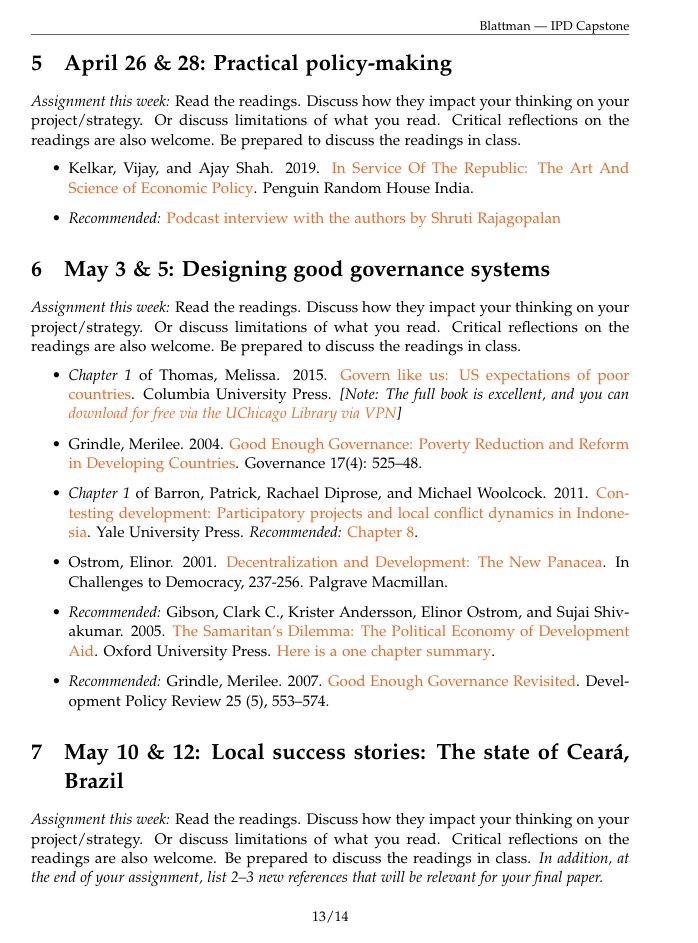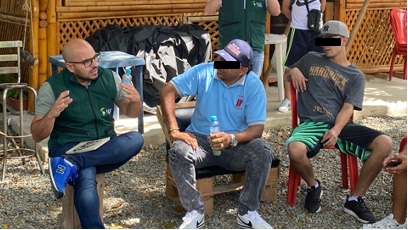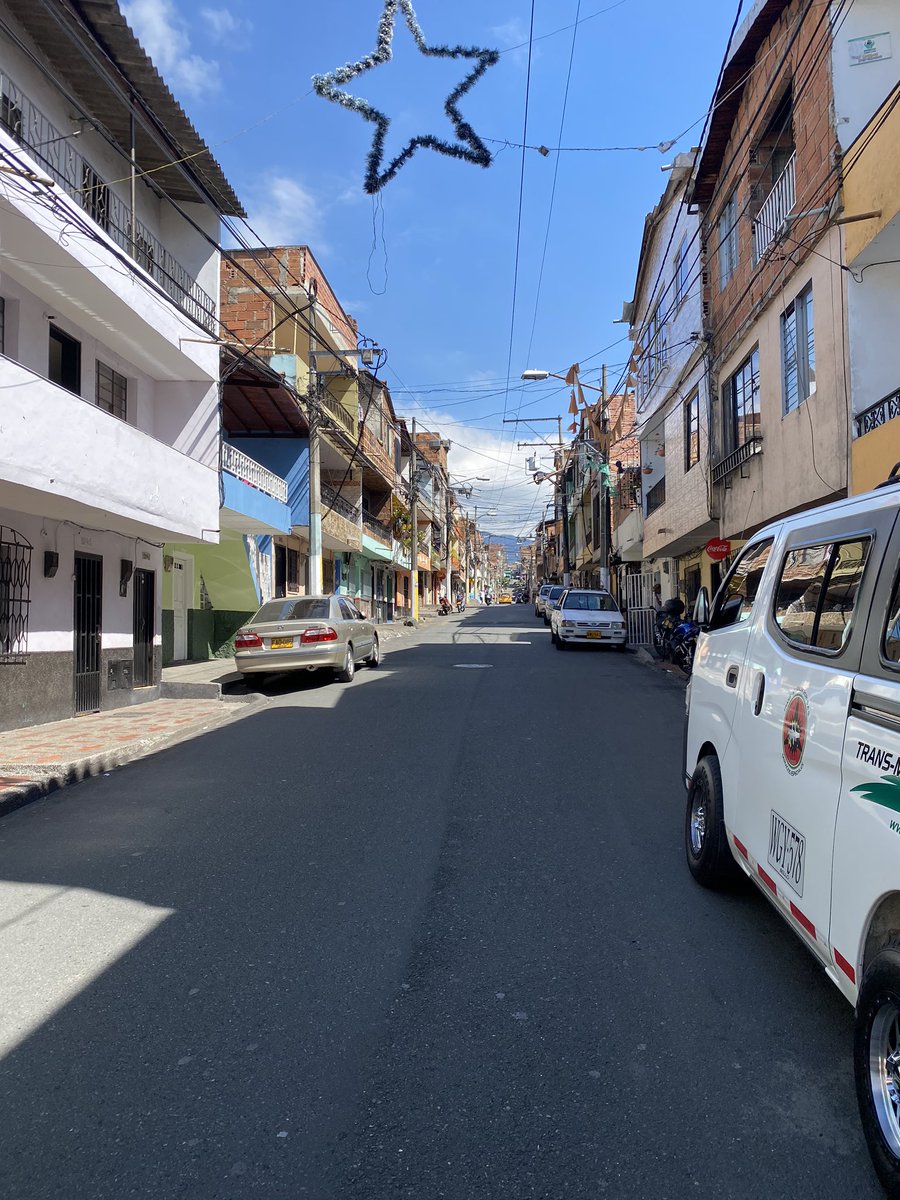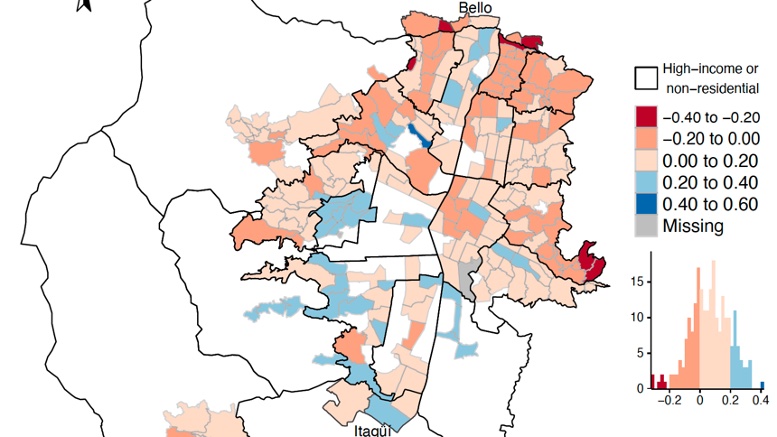
The pandemic changed a lot of teaching for the worse, but I wanted to tweet how it spurred me to try to change the way we teach international policy and development @HarrisPolicy.
In short, we took the opportunity to try to get policymakers all over the world to teach classes.
In short, we took the opportunity to try to get policymakers all over the world to teach classes.

One of the classes I'm most excited about is led by the staff of @BusaraCenter, a behavioral laboratory in Nairobi. A range of East African researchers, faculty, and Busara VP @MSchomerus are leading a class on behavioral research and economics. Students will run real studies! 

What I liked the most is the theme Busara proposed -- representational and diversity issues in development, and what it means to be running research when there's such a power differential. So a quant class with meaningful anthropology, psychology, etc baked in. It's amazing.
I'm also excited about Carlos Fernandez, until recently the Central Bank governor of Paraguay. He'll be teaching on international finance & macro development. Having classes taught by sr policy makers from their home countries is a privilege that the pandemic pushed us to try. 

Not everyone is coming from the other side of the planet. I'm keen to see @AnBrownDC teach a class on global health. She's an executive and research director @FHI360, a huge nonprofit focused on health. She directs their evidence unit. 

Also teaching from Washington is @Gyude_Moore, previously Liberia’s Minister of Public Works and now a fellow at @CGDev. He'll be teaching a class on infrastructure and development, but is also a really deep thinker on Africa's foreign policy towards the rest of the world. 

As an aside, when we get back to normal, I'm hoping we can move these from Zoom to hybrid classes, where scholar-practitioners from around the world can come to @HarrisPolicy for a few weeks and then teach the rest of the quarter remote. Or maybe students go to them!
We will see what the new post-pandemic world brings, but I don't want to stop this model when it's over. I think it's working. I want to embrace and expand it, bringing more and more policymakers from outside the US into our real or virtual classrooms.
I digress. I am also happy that we could get @MiguelSantos12 from the Harvard Growth Lab to teach a class on economic growth policy. Our regular faculty tend to be more micro and political economy in focus, and lecturers like Miguel are how we ensure our students are well served 

We also have Heddy Lahmann, an education scholar, teaching on education policy in developing countries, a great complement to our own @AAdukia 

These new lecturers join a big collection of existing ones, like Rep. Mike Quigley, who represents Illinois in Congress and sits on the Intelligence Committee. He teaches a class here on... the intelligence services. 

Our niche @HarrisPolicy: we try to be the most quantitative and technical MPP program on the market, feeding that huge demand.
It shapes how we choose lecturers too. We are typically looking for scholar-practitioners--people who apply these technical skills in their careers.
It shapes how we choose lecturers too. We are typically looking for scholar-practitioners--people who apply these technical skills in their careers.
This isn't for everybody. I tell our new admits, as they weigh schools, that every policy school tries to serve different needs, and that's a good thing. Some schools aim to be a pipeline into the foreign service. Others have courses by policy stars telling war stories in class.
If you are a student, you need to choose the right fit for the skills and career you want. (And then go to the place that sends you the least in debt!)
My full advice post on choosing a degree here: chrisblattman.com/2013/10/04/wha…
My full advice post on choosing a degree here: chrisblattman.com/2013/10/04/wha…
Our philosophy @HarrisPolicy simple: we don't want lots of specialized degrees. We want most students to come in as a big 2-year MPP or 1-year MA cohort, do an advanced common core together, then choose specializations after through certificates.
Anyways, I won't feature all our international policy and development classes and faculty here. But a few highlights:
Oeindrila Dube leads our conflict curriculum, which is a whole other related certificate, and HUGE. She teaches classes on conflict's causes and consequences.
Oeindrila Dube leads our conflict curriculum, which is a whole other related certificate, and HUGE. She teaches classes on conflict's causes and consequences.

And @RebeccaJWolfe leads our international development & conflict policy labs (classes where you do real projects with real clients) and teaches on humanitarianism too. 

@AmirJina teaches classes on climate, the enviroment and development, and has been teaching our core economic development classes too. 

James Robinson of @WhyNationsFail and Raul Sanchez de la Sierra teach a class on African development, and Raul also teaches our Political Economy of Developing Countries class (my old stomping ground) 



This year I'm teaching a new "capstone class" that I am super excited about. It's more about the how to do policy, and critical analysis of how policy is done, that "what policy". Twitter helped me with my reading list. Here is the final one: 







Of course we are also super excited to welcome recent Nobel-laureate Michael Kremer to our development group. Stay tuned for huge developments in the Development Innovation Lab 

Oh and by the way the Lab is advertising for a founding director!
https://twitter.com/rglenner/status/1364021126201036803?s=20
Stay tuned for more, as we are really ramping up hiring in this area this year and next. There will be many new faces soon.
Also, apologies to all the colleagues I missed. There are limits to my threads! A full list of international classes is here:
harris.uchicago.edu/academics/desi…
Also, apologies to all the colleagues I missed. There are limits to my threads! A full list of international classes is here:
harris.uchicago.edu/academics/desi…
Finally, guess what? We even teach OTHER SUBJECTS. From energy to health to public finance to political campaigns and analytical methods (plus more), we have a ton of certificates. Check them out:
harris.uchicago.edu/academics/desi…
harris.uchicago.edu/academics/desi…
• • •
Missing some Tweet in this thread? You can try to
force a refresh











